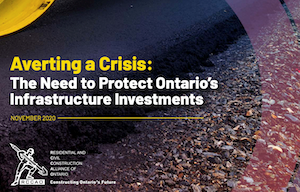41,000 jobs at risk: RCCAO report
A significant number of construction jobs will be at risk is more isn’t done by senior levels of government to prop up their municipal counterparts.
 The latest research study prepared by Prism Economics and Analysis released by the Residential and Civil Construction Alliance of Ontario (RCCAO) suggests that as many as 41,000 construction jobs could be at risk next year if more isn’t done to help municipalities balance their budgets and restore spending on key infrastructure projects.
The latest research study prepared by Prism Economics and Analysis released by the Residential and Civil Construction Alliance of Ontario (RCCAO) suggests that as many as 41,000 construction jobs could be at risk next year if more isn’t done to help municipalities balance their budgets and restore spending on key infrastructure projects.
“We recognize that the federal government has put historic amounts of money on the table and the province has been working collaboratively with municipalities to quickly administer the process to get those funds out,” said RCCAO board chair Peter Smith. “However, despite the Herculean effort of the governments, municipalities are still projecting significant deficits for 2021 and will have no choice but to continue to raid their capital funds in order to balance their budgets.
“This will further delay much-needed infrastructure projects and it will also be too late to fix the problem for the 2021 construction season. Municipalities need a commitment before the end of this year that they will have the support they need to balance their budgets.”
The RCCAO report, Averting a Crisis: The Need to Protect Ontario’s Infrastructure Investments, suggests that as many as 117,000 construction-related jobs depend on steady work from Ontario’s municipalities, universities and colleges, school boards and hospitals. Those jobs include 65,000 people directly employed in in the industry, 29,000 more in the industry’s supply chain for building materials, transportation and warehousing, as well as engineering and architectural work, and a further 23,000 in the broader economy that are supported by construction workers’ spending.
The report draws a link between the recent decline of 35 percent in government and institutional sector building permit values in Ontario between July and September, and the likely effects of a sustained period of declines due to project deferrals and cancellations. It concludes that 41,000 construction jobs could be lost if this trend continues.
 Indeed, many Ontario municipalities have declared that they have been forced to cut capital spending programs in order to balance their books for 2021. For example, the latest report from Toronto city manager Chris Murray suggests the city will “experience $1.885 billion in COVID-19 related financial impacts in 2020.” It adds that a permanent reduction in capital funding is among the options available to the city to offset operating pressures
Indeed, many Ontario municipalities have declared that they have been forced to cut capital spending programs in order to balance their books for 2021. For example, the latest report from Toronto city manager Chris Murray suggests the city will “experience $1.885 billion in COVID-19 related financial impacts in 2020.” It adds that a permanent reduction in capital funding is among the options available to the city to offset operating pressures
Similarly:
- the chief administrative officer of the City of Kingston recommended deferral or closing of 24.8 percent of budgeted capital expenditures,
- the City of Ottawa’s Finance and Economic Development Committee recommended deferral of 33 capital projects,
- the City of Mississauga’s chief financial officer recommended capital deferrals or closures equal to approximately 4.2 percent of budgeted amounts,
- the City of London plans identified 17 capital projects that could be deferred, and
- Hamilton city staff have identified 127 capital projects for possible deferral.
“Due to declining municipal revenues brought on by the COVID-19 pandemic, municipalities are holding back spending on many infrastructure projects,” said Smith. “Contractors in our network have been reporting a significant drop in tenders to bid on, but the jobs at risk is worse than we anticipated.”
RCCAO has said throughout the summer that infrastructure investments will be essential to the economic recovery—and the timely delivery of these projects will be critical to ensuring the health of the construction industry, and the recovery of Ontario’s economy.
Most municipalities have priority state-of-good-repair projects and many local transportation and water system upgrades can be started quickly, providing the economic stimulus that is needed, it says.
The report puts forward four recommendations to support avert what it calls a “foreseeable crisis.” It recommends the federal and the provincial government bring forward their repair expenditure plans—work that can be executed quickly and which has a high multiplier effect on other related jobs.
It also recommends that the province ensure that municipalities, universities and colleges, school boards and hospitals carry out backlogged repair work, and not allow deferrals to repair work. It recommends the province provide additional support to the municipal sector to carry out backlogged repair work, and that the federal and provincial governments work with the municipal sector to bring forward capital spending programs.
"The worst-case scenario for 41,000 workers in Ontario would be that despite all the incredible work and collaboration between the federal, provincial and municipal governments during this pandemic, the actual municipal deficit problem is not solved before February and the 2021 construction year is lost,” said Smith.








